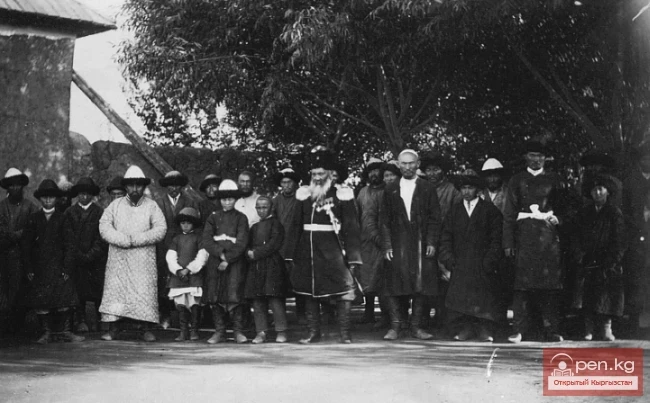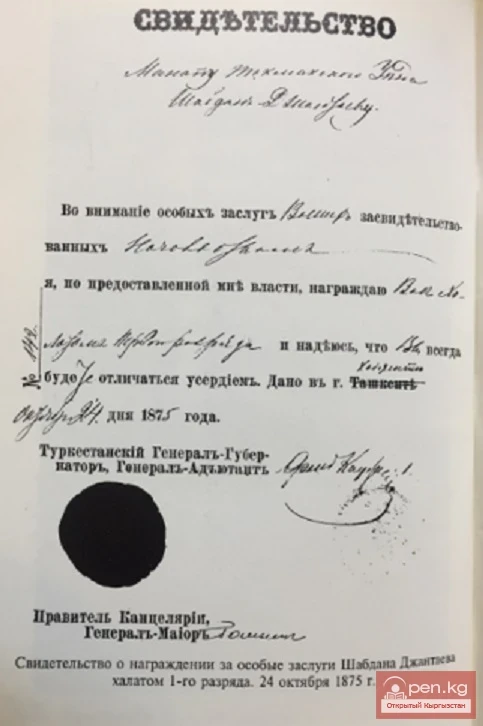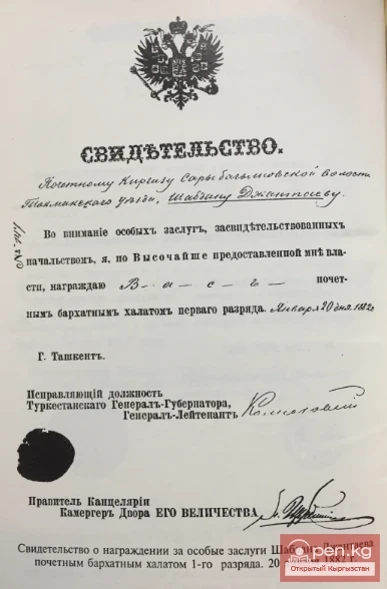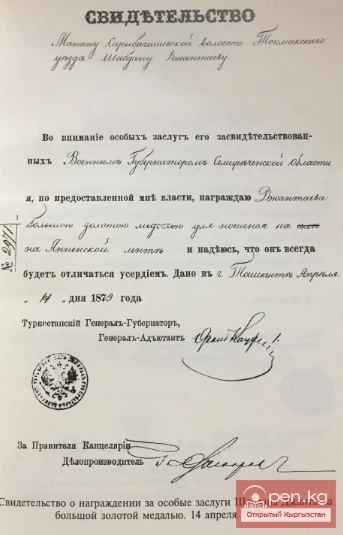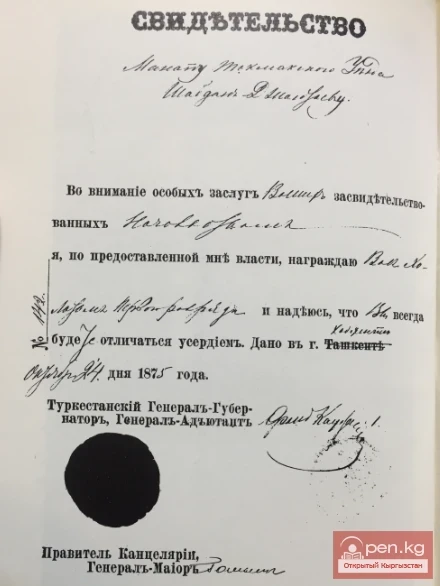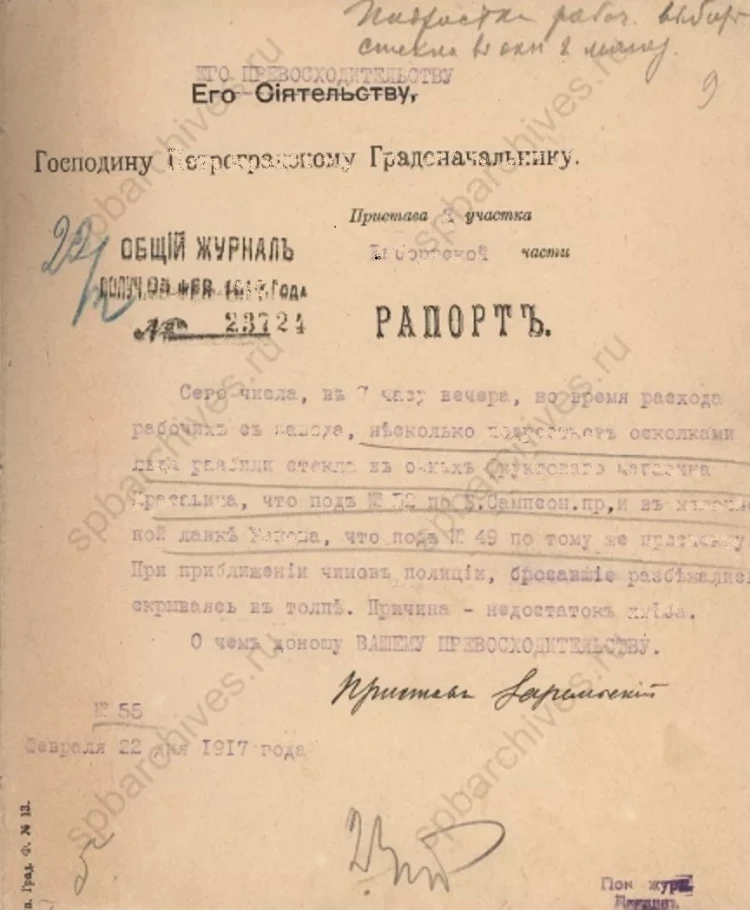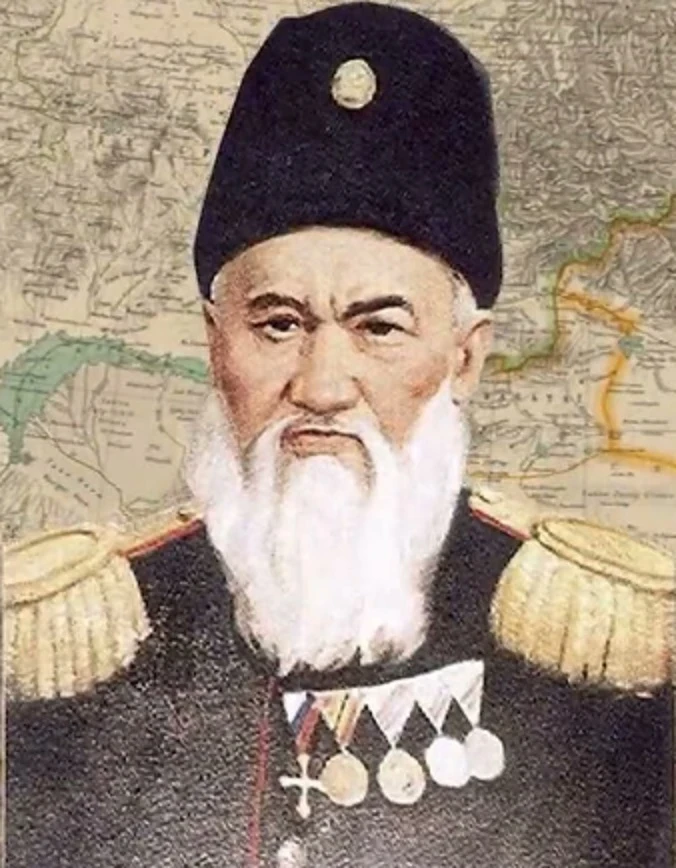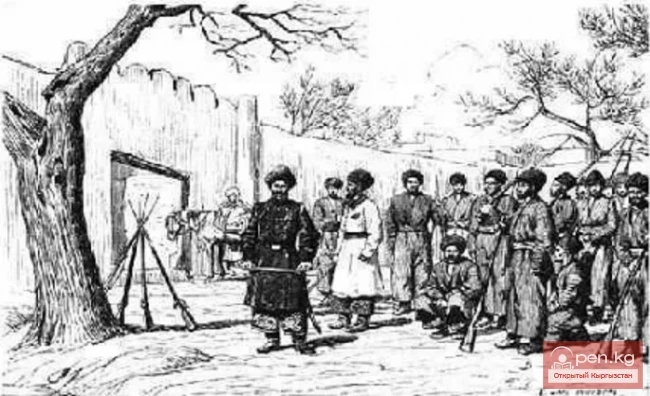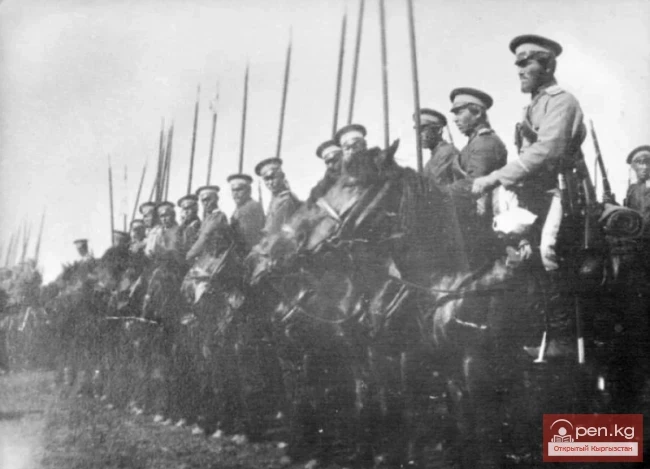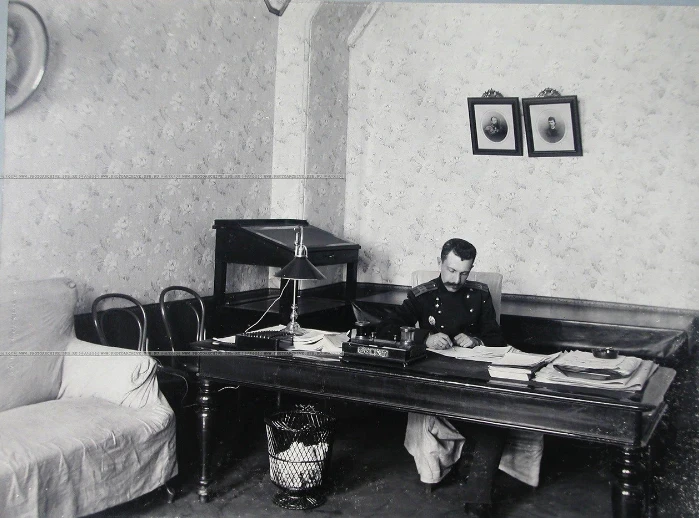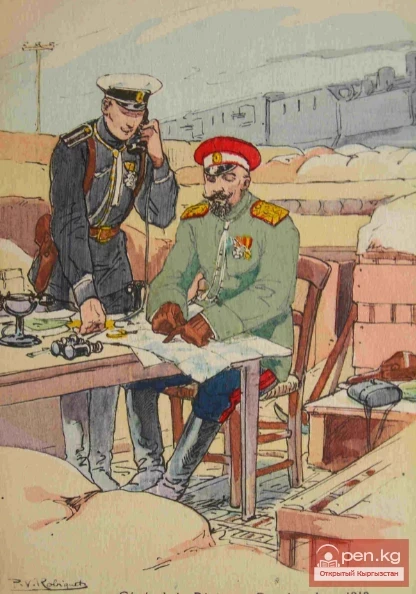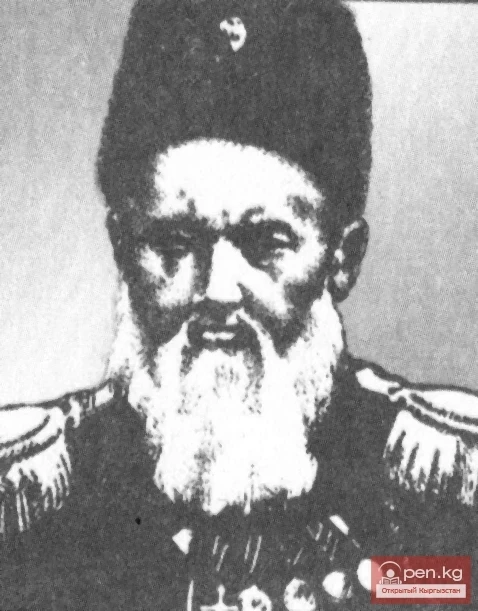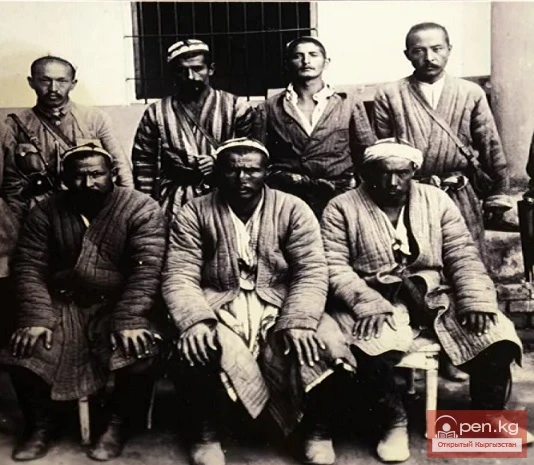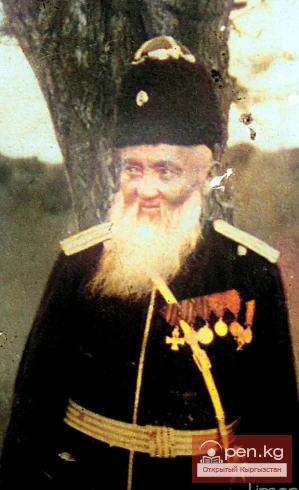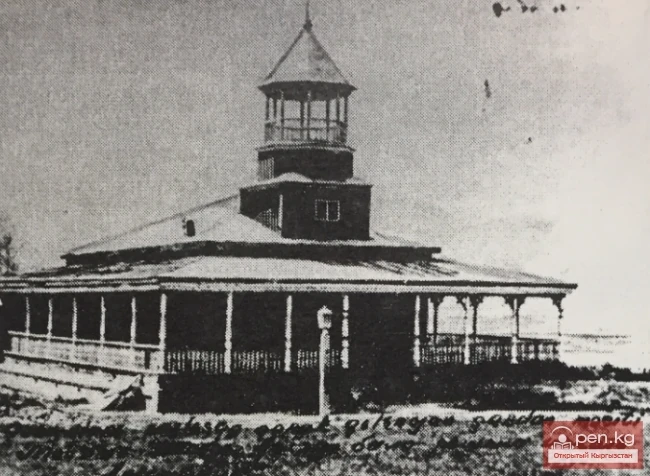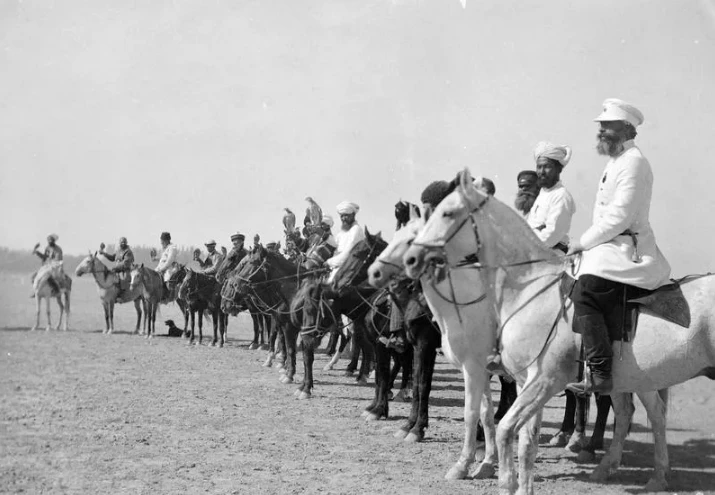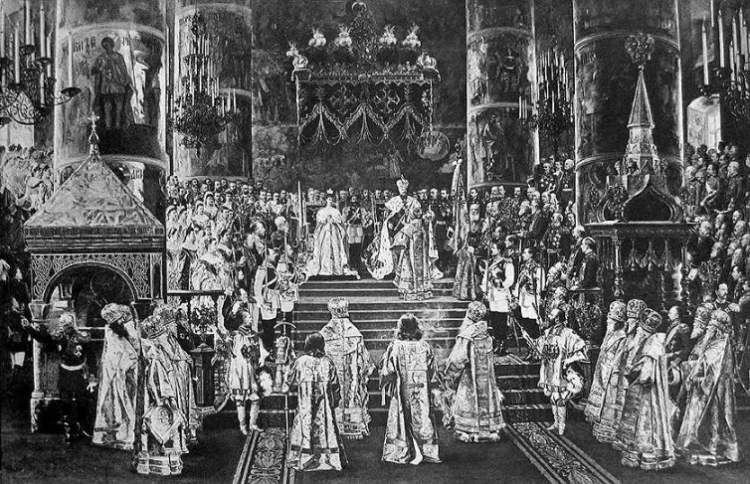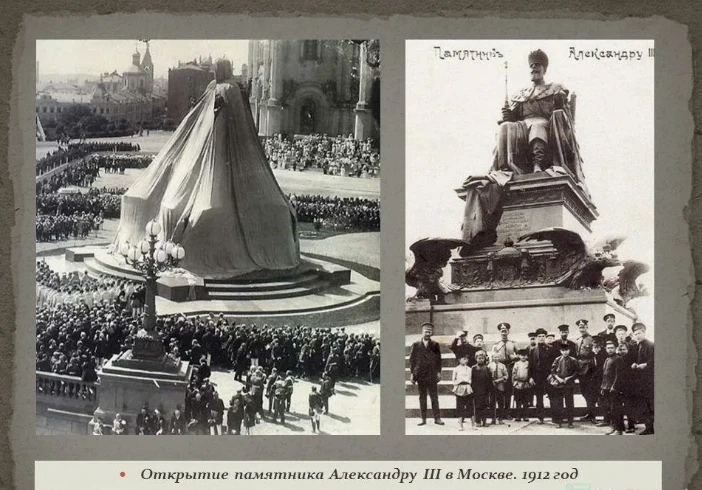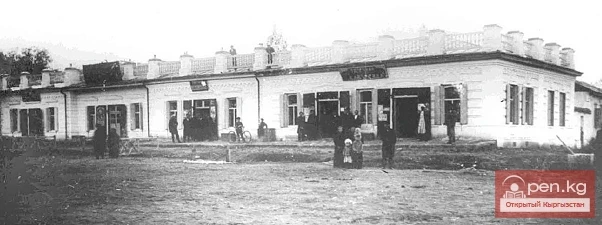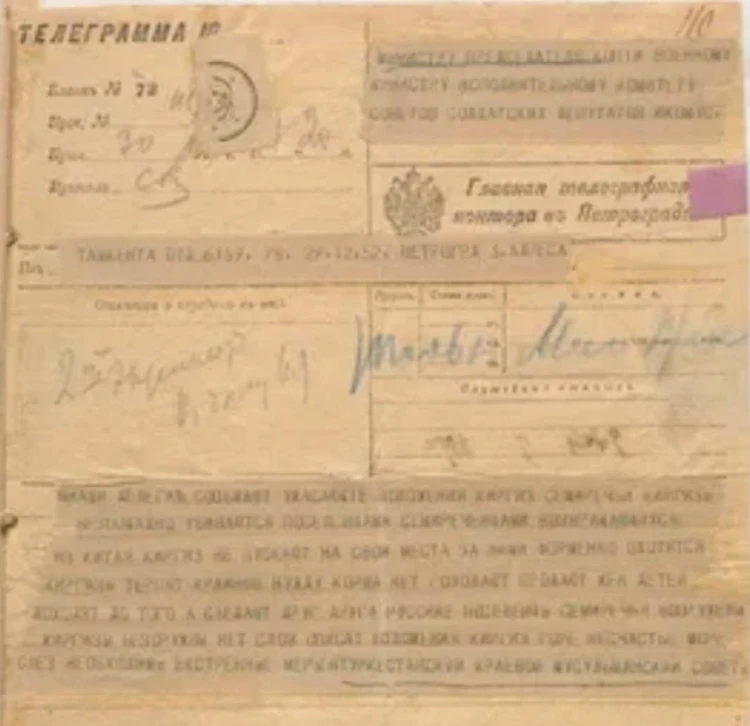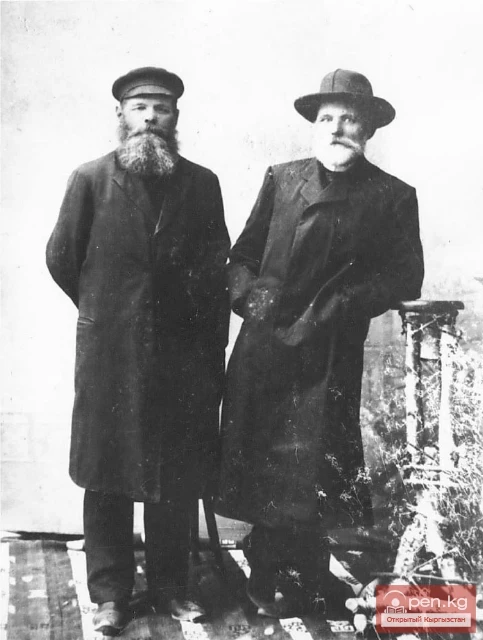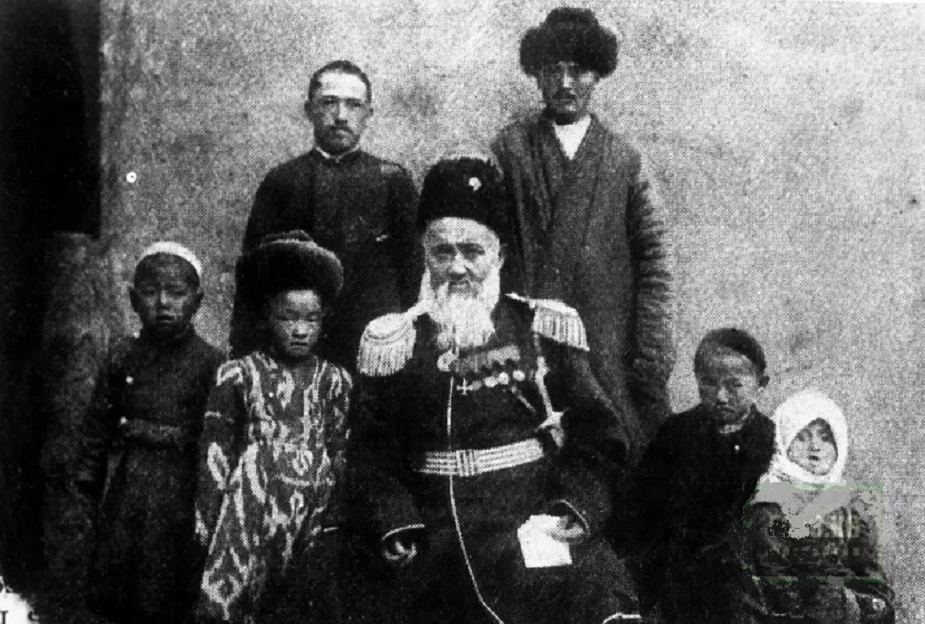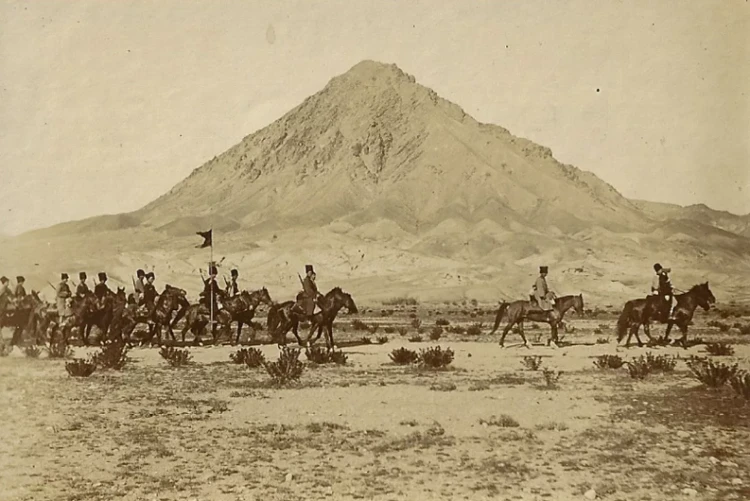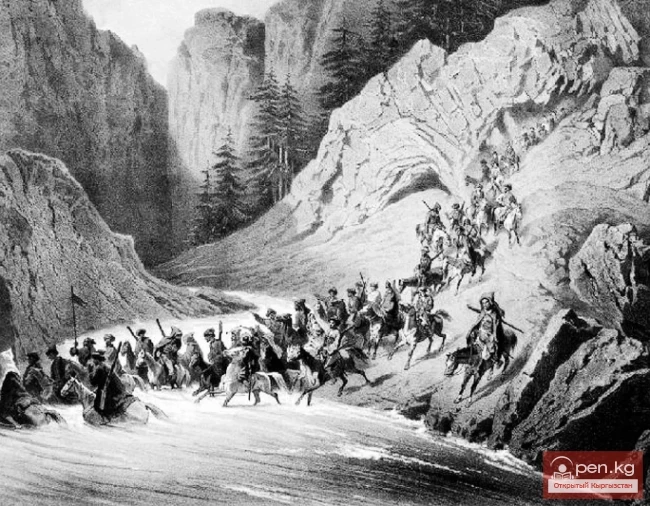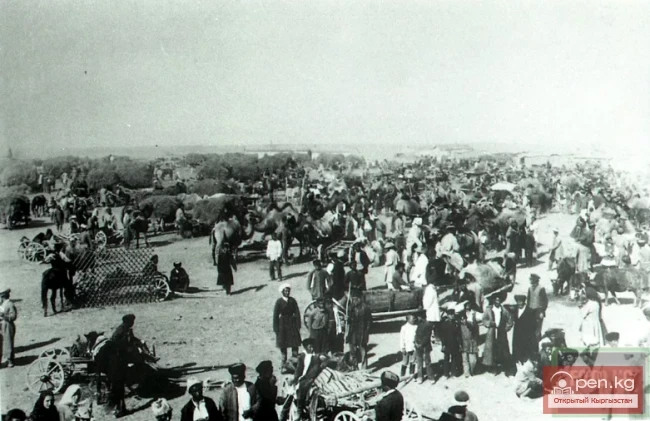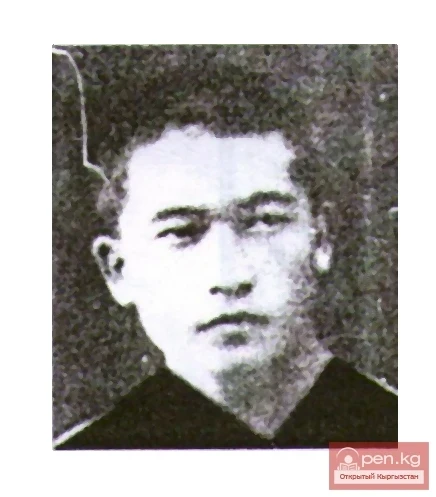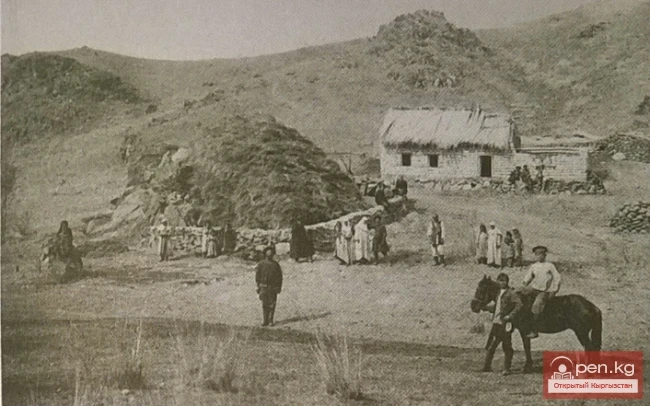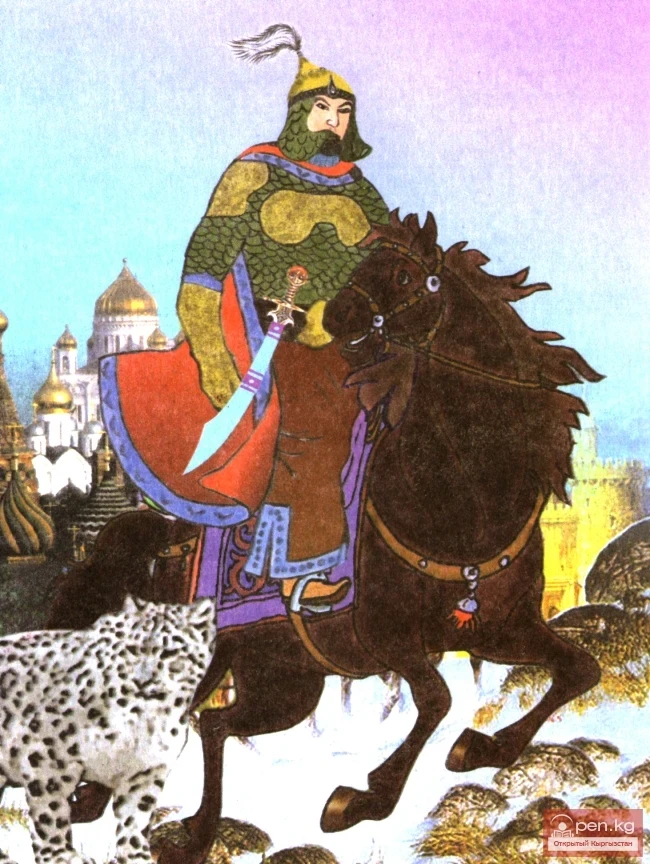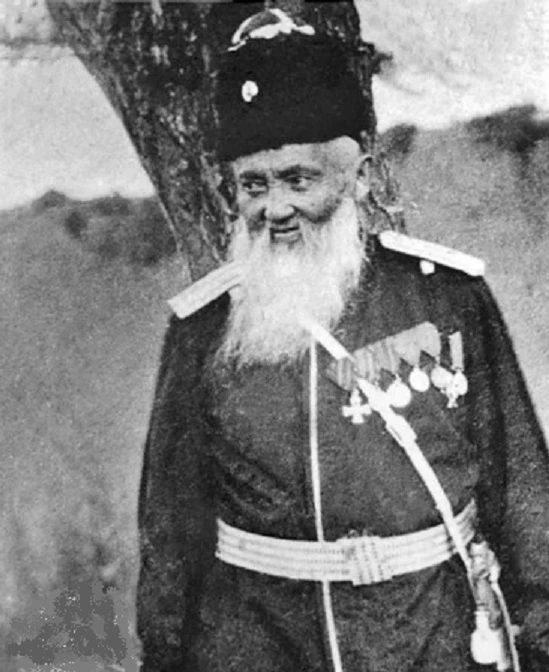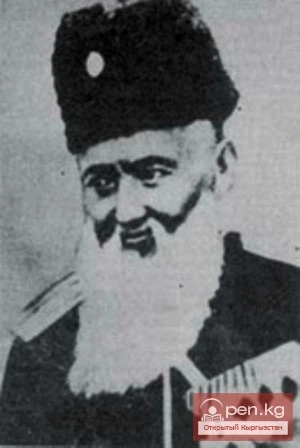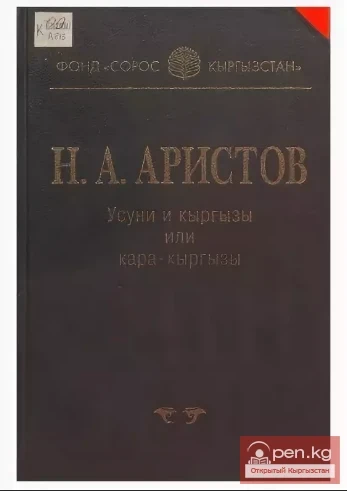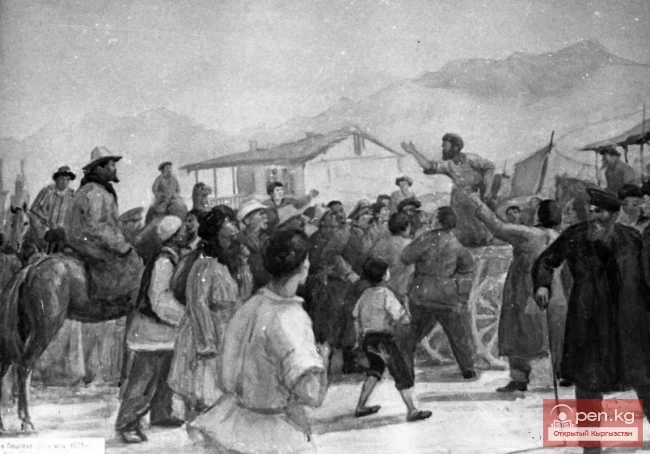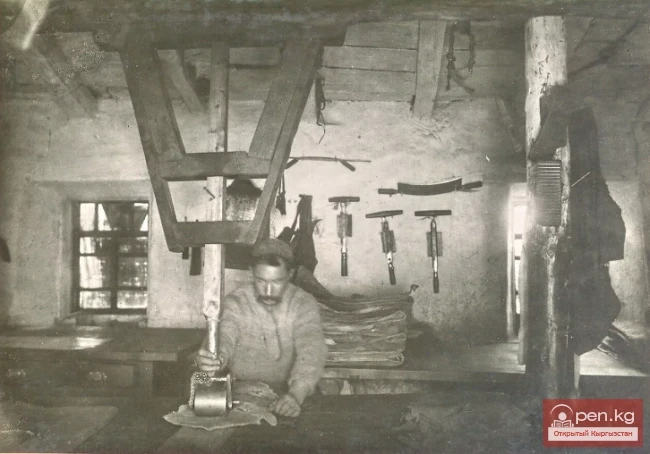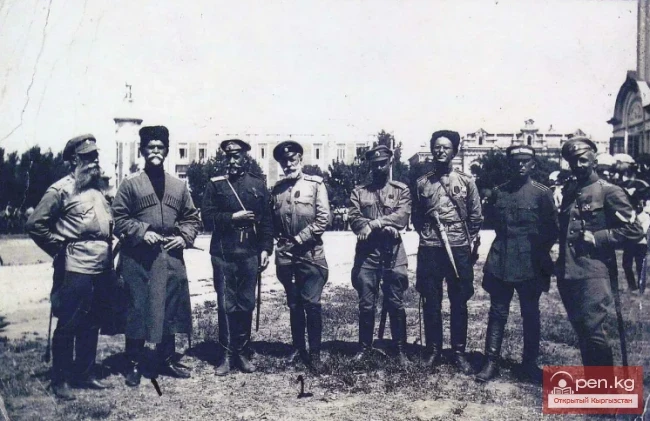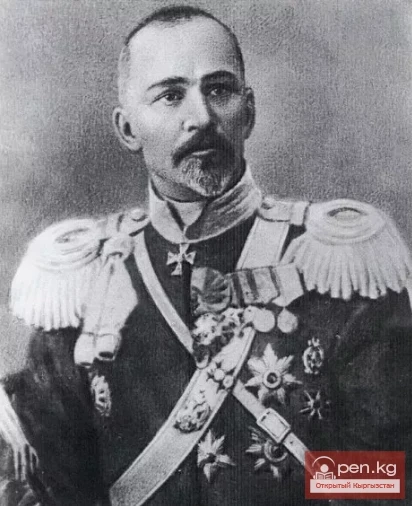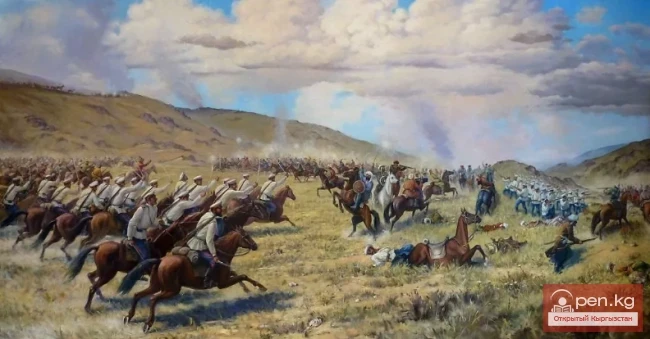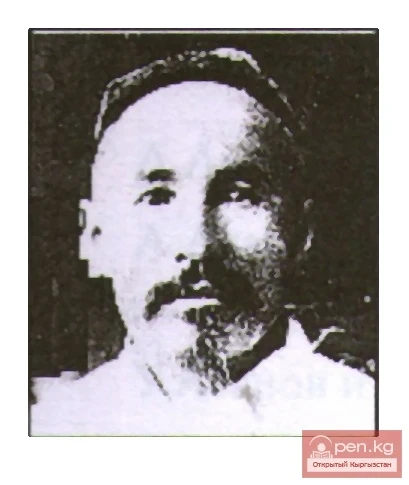The Influence of Shabdan Jantayev among the Kyrgyz of the Semirechye Region
An analysis of the information from sources and the political situation in Kyrgyzstan from the mid-19th to the early 20th centuries convinces us that the personality of Baatyr Shabdan, as an intermediary for the colonial authorities of Russia in managing the new region, was demanded by the very time itself. And he fulfilled this role with honor. It is probably not coincidental that even his ardent opponent, the head of the Pishpek district, A. Talizin, was forced to state back in 1896 that "...the influence of Shabdan Jantayev is primarily based on his personal merit before the Russian government, ... although his nobility (i.e., his descent from the manap environment — the Kyrgyz ruling aristocracy — D. S.) is significant, he gained prominence among the Kyrgyz through his intelligence and dexterity. ... He has other influential acquaintances (besides Baron Shtakelberg and G. A. Kolpakovsky) that the Pishpek district officials wouldn't even dare to dream of, and therefore they must meet with Shabdan differently than with other manaps. The people see this and consider Shabdan to be strong with the Russian government, and therefore authoritative... He is given advantages precisely based on his merits and also, as the Kyrgyz say, because he knows many good gentlemen, with whom he knows how to conduct himself."
A little later, another representative of the Russian administration — the senior official for special assignments under the Military Governor of the Semirechye region, titular adviser Nikolai Alexandrovich Prokopov, in his report to the Military Governor of the Semirechye region P. P. Ostashkin dated June 18, 1913, explained the reasons for the established close relationship between the Tokmak district police officer, Staff Captain Kuguikov, and Baatyr Shabdan, writing:
"1) that Shabdan Jantayev held the rank of Army Senior Officer and was a holder of the Order of St. George,
2) that Shabdan Jantayev was highly valued and called his 'friend' by such prominent figures as General-Adjutant Kuropatkin, Cavalry General Shtakelberg (Georgy), the late member of the State Council Prince Volkonsky, the late Infantry General G. A. Kolpakovsky, the late Turkestan Governors-General S. M. Dukhovsky and N. A. Ivanov, Artillery General Topornin, Chamberlain M. G. Kolpakovsky, and former Military Governors of the Semirechye region A. Ya. Frid, G. I. Ivanov, and M. E. Ionov, and the current Chief of the West Siberian Cossack Brigade, Lieutenant General Kalitin,
3) that the late Shabdan Jantayev enjoyed special attention from all Turkestan and Steppe Governors-General, Military Governors of the Semirechye region, and Heads of the Pishpek district,
4) that Shabdan Jantayev, who had colossal influence among the Kyrgyz of the Semirechye region, significantly eased the local administration's work in managing not only the Tokmak district but the entire Pishpek district, stopping strong disputes among the Kyrgyz and thefts of cattle and horses, both mutual and from the Russian population, and during the period after the earthquake on December 22, 1910, in gathering information and distributing aid to the Kyrgyz of the Sarybagysh and Atekinsky volosts affected by the earthquake,
5) that Shabdan Jantayev was a person of the highest non-demanding nature and never made any demands for compensation for the services he rendered, even indirectly,
6) that Shabdan Jantayev enjoyed a reputation among the Kyrgyz as a person of high integrity and, most importantly, as a selfless individual."
Regarding the lifestyle and activities of Baatyr Shabdan, A. Talizin writes: "that in the steppe he plays a role akin to that of an assistant to the district chief, people come to him with complaints, which he addresses, asking for his intercession with the higher government, and he advocates on behalf of all the Kyrgyz in the district when it comes to concluding debt transactions, requests for his mediation or guarantees, and he fulfills this as well. He is constantly occupied with public affairs..."
According to the teacher of the Tokmak Russian-native school, Vasily Petrovich Rovyagin, "Every day was a business day for Baatyr. From near and far places, hundreds of Kyrgyz flocked to Baatyr's house with their affairs and thoughts.
Many complicated family and everyday matters were resolved by Baatyr as an authoritative arbitrator according to 'adatu' (custom). Baatyr was the ruler of Kyrgyz thoughts. He sowed peace and comfort among the feuding and aggrieved — and earned respect. Hundreds of Kyrgyz people were fed at Baatyr's place. Many brought and delivered to Baatyr the deserved tribute in the form of horses, rams, and more, and all these offerings went to the people. Dozens of the destitute — the elderly and the old women — were supported at Baatyr's. Baatyr never refused anyone anything. And no Kyrgyz or Kyrgyz society ever refused Baatyr anything."
As we can see, Shabdan was not only an unofficial assistant to the district chief but also managed practically all matters of extraordinary gatherings and arbitration courts. This is clearly evidenced by the lines from an archival document from the 1870s: "In the Kara-Kyrgyz volosts of the Pishpek district, power over the people was seized by two clan manaps — Cholponkul (i.e., son of Jangarach — D. S.) from the clan (more precisely, the clan-tribal group — hereinafter abbreviated as RPT — D. S.) solto and Shabdan from the clan (i.e., RPT) sarybagysh, in whose hands lies all judicial and administrative power: people's judges at all extraordinary gatherings decide matters according to the instructions of these two main manaps." And notably, according to the head of the Pishpek district, "in his presence (i.e., in the presence of Shabdan in society — D. S.), the positions of volost administrator and legal judges do not have proper significance." At the same time, as follows from the service record of the army senior officer of the militia Shabdan Jantayev, he "was not in active service... and did not hold any position" either in the local or colonial Russian administration. Is this not an example of selfless service to the homeland! Such a rare phenomenon in state administration gives reason to believe that one can be useful to society and leave a good memory in the history of the people even without an official position.
Baatyr, in demand by the era. Part - 1
